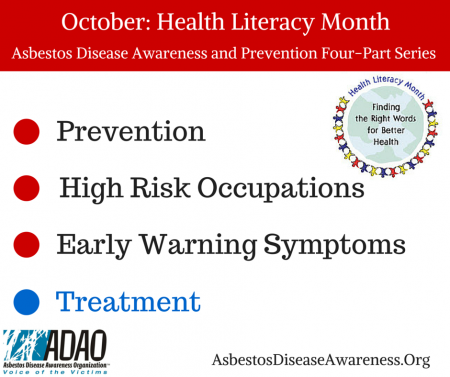Posted on September 28, 2023
October 2nd — Part One: Prevent Asbestos Exposure
October 9th — Part Two: Recognize High-Risk Occupations
October 16th — Part Three: Understand the Warning Symptoms for Asbestos-Caused Diseases
October 23rd — Part Four: Finding a Center of Excellence for Treatment
When Alan was diagnosed with mesothelioma in 2003, the word “cancer” itself felt alien and terrifying, and the American Cancer Society (ACS) was an organization I had never heard of. How I wish I had known about them sooner! It was my loss, because ACS turned out to be nothing short of amazing. American Cancer Society Cancer Action Network also deserves a huge thank you for the crucial role they have played in helping us push ARBAN, a comprehensive ban on asbestos.
Cancer is not just a diagnosis. It is a journey, often overwhelming and isolating, that affects not only the person diagnosed but also their friends, families, and communities. While the medical community is hard at work researching and implementing advanced treatments, the emotional, practical, and informational needs of patients and their families are paramount. Thankfully, the American Cancer Society (ACS) stands as a pillar of support, offering an array of resources to guide individuals through their cancer journey.
Here’s a snapshot of the invaluable resources that ACS provides:
- Patient Programs: At the heart of ACS’s mission is the genuine care and concern for those diagnosed with cancer. Their patient programs offer counseling, information, and resources tailored to the unique needs of each individual.
- Free Rides to Treatment: Transportation should never be a barrier to receiving the best cancer care. Recognizing this, ACS provides free rides to and from treatment centers, ensuring that every patient can access their appointments without stress.
- Free Lodging During Treatment: The costs associated with cancer care can be burdensome. To ease this, ACS provides patients and their caregivers with free lodging near treatment centers, making the treatment journey a little less taxing.
- ACS CARES™: An initiative aimed at connecting patients with essential resources, ACS CARES™ ensures that everyone has access to the tools and information they need to navigate their cancer journey.
- Connect with Survivors: Finding solidarity in shared experiences can be therapeutic. ACS facilitates connections between survivors, allowing them to share stories, insights, and support.
- Breast Cancer Support: Given the unique challenges faced by those diagnosed with breast cancer, ACS has specific programs to support and empower them, from diagnosis to recovery.
- Cancer Survivors Network: This is a vibrant community where survivors come together, offering a space for discussion, storytelling, and mutual encouragement.
- Reach To Recovery: For those needing a personal touch, Reach To Recovery connects recently diagnosed individuals with survivors, bridging the gap of understanding and providing direct support.
- Survivor Stories: Real stories from real people can be a source of immense inspiration. Through Survivor Stories, individuals share their experiences, triumphs, and challenges, shedding light on the multifaceted journey of cancer.
- 24/7 Cancer Helpline: Questions don’t keep office hours. Whether it’s 2 a.m. or 2 p.m., the ACS helpline is available around the clock. Simply call 1-800-227-2345 for support, information, or just a listening ear.
- Schedule a Video Chat: In our digital age, a face-to-face connection can still be invaluable. With the option to schedule a video chat, patients and families can access support in a format that feels personal and intimate.
- Resource Search: Not sure where to start? ACS’s comprehensive resource search lets you find precisely the support you need, tailored to your circumstances.
In the fight against cancer, no one should ever feel alone. The American Cancer Society stands steadfast in its commitment to provide holistic support, understanding, and resources for everyone affected. Whether you are a patient, survivor, caregiver, or concerned friend, ACS is here for you, lighting the path during the darkest times.
ADAO encourages individuals to consult a range of sources to find the medical practitioner that best suits their treatment needs. The National Cancer Institute is an excellent source, providing information on clinical trials and materials in both English and Spanish to answer your questions on “How to Find a Doctor or Treatment Facility if you Have Cancer.”
I sincerely hope that patients and families impacted by asbestos exposure will find this medical resource page beneficial as a guide in finding a doctor, getting a second opinion, and choosing the best treatment facility.
As we say at ADAO, “Hear Asbestos. Think Prevention.” Thank you for joining us and sharing this life-saving information during Health Literacy Month.
